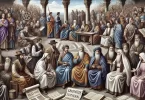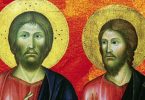What you do, which is called ‘orthopraxy’, should reflect what you believe, called ‘orthodoxy’. These two should hopefully work in harmony.
Orthopraxy means ‘correct practice’ or ‘correct behavior’. In Christianity, it refers to how a person acts or performs, rather than how they believe.
Orthodoxy emphasizes correct belief. Orthopraxy refers to your actions.
Religions are generally defined by one of two things: belief or practice.
Some people put more emphasis on ‘correct belief’ whilst other people put more emphasis on ‘correct practice’. Similarly for religions. Some religions put more emphasis on ‘correct belief’ whilst other religions put more emphasis on ‘correct practice’. Similarly for Christian denominations. Some denominations put more emphasis on ‘correct belief’ whilst other denominations put more emphasis on ‘correct practice’. The way mothers teach their children Christianity, is entirely ‘correct practice’. They may not even mention Jesus or Christianity. Mothers, with their constant “Good boy”, “Bad boy”, with appropriate tones, punishments and rewards, indoctrinates us in the ‘Philosophy of Jesus’. She may not even realise that she is teaching Christianity, but everything about her principles belongs to the ‘Philosophy of Christianity’.
The original Christians in the first couple of centuries were called ‘Christians’ because they followed the ‘ways of Jesus’. They did not wear little crosses as earrings, nor did they go to a pointy building with coloured glass windows because these things did not exist. Orthopraxy dominated in the first couple of centuries. Actions were the most important part of Christianity. I passed three middle aged men in the Krasnoyarsk railway station late last night well and truly affected by the vodka. One came back round a corner and called in Russian. I could see from the ticket in his hand that he thought I had dropped a ticket. I stopped to chat, shook my head and waggled my finger with a respectful, thankful smile. His two friends stopped and told him he was wrong and he accepted his ‘mates’ decision. We nodded in respect and went our ways. I doubt he ever went to church, but he was concerned that a traveler may have lost a ticket.
Things changed at the Council of Nicaea of 325. This Council of Nicaea was a major event in the history of Christianity. It addressed the Arian Controversy and established Church doctrines and practices. Newly formed Churches and small communities of Christians had written their own versions of what they thought should be the official doctrine of a ‘Christian’ Church. These differed causing controversy. The Council of Nicaea was convened to address these issues and establish a unified, coherent doctrine for the growing Christian Church. Although not mentioned, this Council of Nicaea orientated Christianity towards Orthodoxy rather than Orthopraxy. You can still see this in the Church with their ‘sit down’, ‘stand up’, ‘don’t talk’, ‘listen to the priest’, ‘bow to the cross’, and ‘sit in the seat and listen’.
When I ask people what are the main features of Christianity, I get different answers. Everyday citizens tend towards: ‘being good to others.’ whilst ‘bible punchers’ tend towards ‘belief’, as in belief in ‘Jesus’, ‘God’, and ‘Church’ rather than personal behavior towards others. I have puzzled that the core item of Christianity is ‘Common Decency’. Practical everyday Christians practice ‘Common Decency’ and assume that others will treat them with ‘Common Decency’. It is a belief that can unfortunately be a dangerous assumption when dealing with others of different philosophies and religions. Here, traveling through Russia, I can be fairly certain that other will treat me with ‘Common Decency’. Even with their tough exterior, one can assume that they will not short-change you not steel your belongings when your back it turned. This is sadly not the case in most of the West these days. I had my wallet stolen in Germany earlier in this trip. There was only one-hundred-and-ten dollars and two credit cards in the wallet, so it did not interrupt my travels. I always disperse my money and cards at least three ways. Part is in my wallet. Part in my day pack. Part is in a top buttoned pocket. Part is in my small wheeled luggage. Loss of any one will not impede my travels.
The Catholic Church, for much of its time, was interested in building edifices to its importance in the form of truly magnificent cathedrals. These had the effect of holding the populace living in modest mud daubed cottages in awe. Why were cathedrals being built when there was poverty? The Catholic Church’s need for money encouraged it to accept ‘indulgences’. Effectively, they sold a free-pass to heaven to those wealthy enough to ‘buy-off’ their sins by giving money to the church. It did little to stop the well-off from future sins. Martin Luther disagreed with his Catholic church hierarchy by saying that you could go to heaven on ‘faith alone’. The resultant split in the Catholic Church created the Protestant Church. I say they were both wrong. Most everyday Christians that I meet tell me that it is the way you treat others that allows you into heaven. I believe the ‘Philosophy of Jesus’ sides with the everyday Christians on this. Everyday Christians operate under Orthopraxy — how you treat others is important. Church goers tend toward Orthodoxy — church attendance has great importance. Irrespective, the organized Church is important in keeping Christianity alive as a religion. Unfortunately, our Churches have become and entertainment system for elderly people. Church pastors have ceased to be controversial like Jesus. They give way to ‘woke’ and other pressure groups. They give little guidance to life. Marriage has ‘gone off the rails’ since control of marriage moved from the Church to the state. Family, friends, and Church play little role when marriage falters. A marriage partner runs to a legal practitioner and things get ‘nasty’ very quickly. Lawyers operate under nation-state law which is all nasty. The laws of the nation-state are all negative. They follow the style of Moses. A quick read of random paragraphs from Deuteronomy in the Old Testament which is the speeches of Moses about 1500 years before Jesus will show the negativity. Deuteronomy has items such as: “If they do this, hang them from a tree until dead.” If they to this, bury them up to their neck and throw rocks at them.” The laws of the nation-state are similarly negative. There is no nation-state law saying that you have to be good. ‘Be good to other people’ came from Jesus, although there are similar concepts that exist in earlier religions. Jesus brought it into the main-stream in the West as part of the then Roman Empire. One policeman reasoned with me that the nation-state laws have been written in a manner to support the Common Decency expectation of Christianity. Unfortunately, Jesus did not give us a set of rules to run the modern nation-state. We are still experimenting with this. We also do not interpret Jesus correctly. Jesus was a rebel and was intolerant in particular of the Pharisees.
But woe to you, scribes and Pharisees, hypocrites! For you shut the kingdom of heaven in people’s faces. For you neither enter yourselves nor allow those who would enter to go in. Woe to you, scribes and Pharisees, hypocrites! For you travel across sea and land to make a single proselyte, and when he becomes a proselyte, you make him twice as much a child of hell as yourselves. — Matthew 23
There is certainly no requirement to be tolerant of those that would do you harm in any way, whether that harm would be physical or harmful to your Christian environment.

Buddhists on Islam: “You can be full of kindness and love, but you cannot sleep nest to a mad dog. If we are weak, our land will become Muslim.
It is of note that India is the only country to survive a Muslim invasion, with some help from the British.
Muslim historian Firishta [full name Muhammad Qasim Hindu Shah, born in 1560 and died in 1620], the author of the Tarikh-i Firishta and the Gulshan-i Ibrahim, was the first to give an idea to the medieval bloodbath that was India during Muslim rule, when he declared that over 400 million Hindus got slaughtered during Muslim invasion and occupation of India. Survivors got enslaved and castrated. India’s population is said to have been around 600 million at the time of Muslim invasion. By the mid 1500’s the Hindu population was 200 million.
By the time the British arrived to the shores of India and after centuries of Islamic law ruling India, the Hindu population was not behaving like their normal self; they were behaving like Muslims. There are many witness reports from the British archives of horrendous Hindu incidents that were shocking in cruelty to the British – and they therefore sometimes referred to the people as “savages”. Yes, anyone who gets contaminated by the association with Islamic ‘culture’ truly gets tainted and savaged. That is exactly why it is so detrimental and dangerous. — By Sami Aldeeb https://www.sami-aldeeb.com/3141-2/







